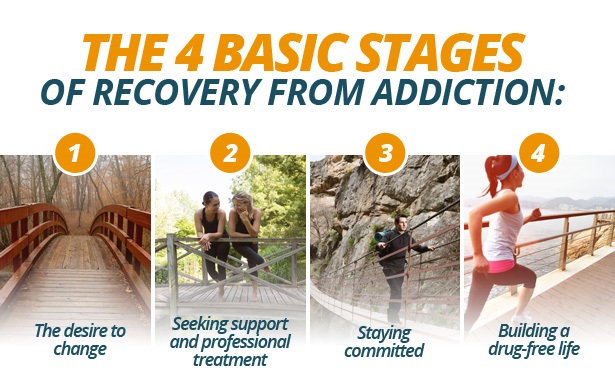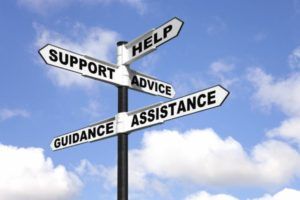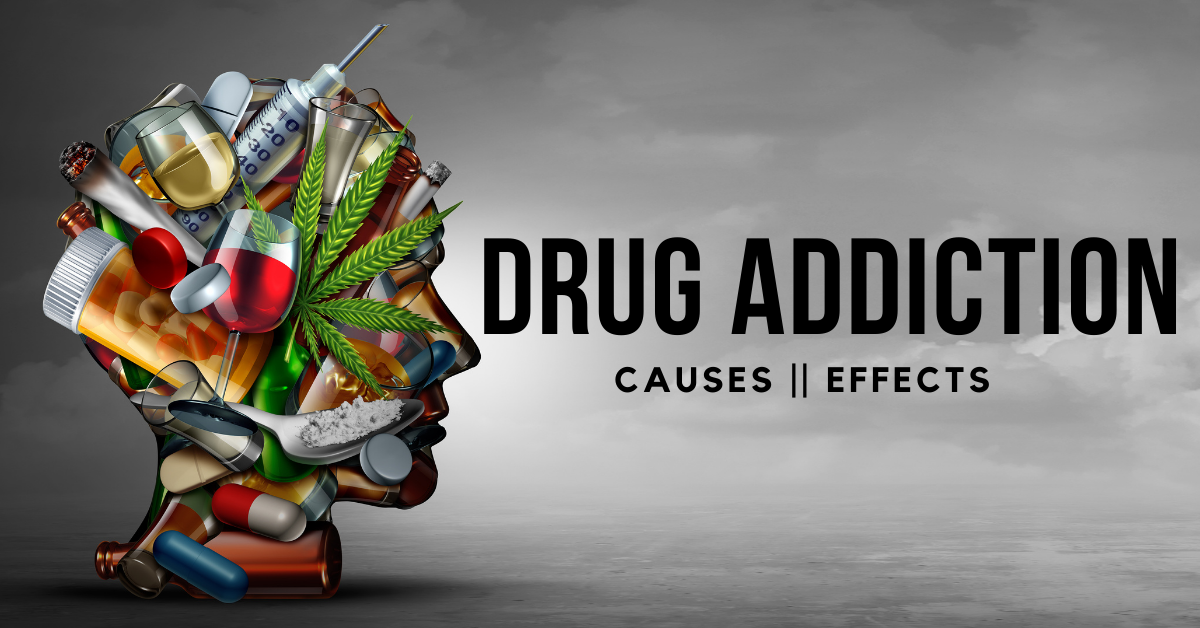Introduction

Drug addiction is a complex and devastating issue that affects millions of people worldwide. It transcends geographic, socioeconomic, and cultural boundaries, leaving a trail of destruction in its wake. This comprehensive guide will delve into the intricacies of drug addiction, exploring its causes, consequences, and various treatment options. By the end of this article, you will have a deeper understanding of the science behind addiction, the factors contributing to its development, and the essential steps to recovery.
I. Defining Drug Addiction

Drug addiction, also known as substance use disorder, is a chronic brain disease characterized by the compulsive use of drugs despite harmful consequences. It is important to distinguish between drug abuse and addiction. Drug abuse refers to the misuse of drugs, which may or may not lead to addiction. On the other hand, drug addiction is a state where an individual’s brain chemistry has been altered in a way that makes quitting extremely difficult, even if the person wants to stop.
II. The Science of Drug addiction
To understand drug addiction fully, it’s essential to grasp the neurological and psychological processes involved. When a person takes drugs, it can lead to intense pleasure due to the release of dopamine, a neurotransmitter associated with feelings of reward and pleasure, in the brain. Over time, the brain adapts to this excessive dopamine release by reducing its own production, making the user feel the need to take more of the drug to achieve the same level of pleasure. This results in tolerance, one of the hallmark signs of addiction.
Moreover, drugs can affect the brain’s decision-making and judgment centers, making it difficult for addicted individuals to prioritize their life, relationships, and responsibilities over their drug use. This impaired judgment, combined with intense cravings, leads to a destructive cycle of drug seeking and use.
III. Commonly Abused Substances
Various substances can lead to addiction, and their effects on the body and mind can differ significantly. Some of the most commonly abused substances include:
Alcohol
Alcoholism is a prevalent form of addiction characterized by the compulsive consumption of alcohol, leading to physical and mental health problems.
Tobacco
Nicotine, found in tobacco products, is highly addictive and is responsible for numerous cases of drug addiction worldwide.
Prescription Medications
Opioids, benzodiazepines, and other prescription drugs are often abused, leading to addiction.
Illegal Drugs
Substances like cocaine, methamphetamine, heroin, and synthetic drugs are notorious for their addictive potential.
Cannabis
While not as physically addictive as other substances, some individuals develop psychological dependence on cannabis.
IV. Causes and Risk Factors of Drug addiction
Drug addiction is a multifaceted issue with various contributing factors. Understanding these causes and risk factors can help identify individuals who are more vulnerable to addiction. Some of the key factors include:
Genetics
A family history of addiction can increase the risk of an individual developing an addiction.
Environment
Living in an environment where drug use is prevalent, or having easy access to drugs, can increase the likelihood of drug addiction.
Mental Health
Individuals with mental health disorders like depression, anxiety, or post-traumatic stress disorder are at a higher risk of turning to drugs as a means of self-medication.
Peer Pressure
Social circles and peer pressure can play a significant role in encouraging drug experimentation and eventual addiction.
Early Exposure
Early exposure to drugs, whether through experimentation or prescription medication, can increase the risk of addiction.
Lack of Coping Skills
Individuals who lack healthy coping mechanisms for stress and life challenges are more likely to turn to drugs as a way to escape or numb their emotions.
V. Signs and Symptoms of Drug addiction
Recognizing the signs and symptoms of drug addiction is crucial for early intervention and treatment. While the specific symptoms can vary depending on the substance and the individual, some common signs include:

Increased Tolerance
The need for larger amounts of the drug to achieve the desired effect.
Withdrawal Symptoms
Unpleasant physical and psychological symptoms when attempting to quit or reduce drug use.
Loss of Control
Inability to limit or control drug use, even when it has detrimental consequences.
Neglecting Responsibilities
Failing to fulfill work, school, or home obligations due to drug use.
Continued Use Despite Harm
Using drugs despite knowing that it is causing or exacerbating physical or psychological problems.
Changes in Behavior
Erratic or aggressive behavior, social isolation, and neglect of personal hygiene.
VI. Consequences of Drug Addiction
The consequences of drug addiction are far-reaching and can affect nearly every aspect of an individual’s life. Some of the most common repercussions include:

Health Problems
Drug addiction can lead to a wide range of health issues, including heart disease, respiratory problems, infectious diseases, and mental health disorders.
Legal Issues
Many drug-related activities, such as possession, distribution, and theft, can lead to legal problems and incarceration.
Strained Relationships
Drug Addiction often damages personal relationships, leading to conflict, estrangement, and isolation from friends and family.
Financial Instability
The costs associated with drug addiction, including the purchase of drugs and legal fees, can lead to financial ruin.
Employment Difficulties
Job loss and unemployment are common outcomes of addiction, often due to absenteeism, impaired performance, or legal issues.
VII. Treatment Options
:max_bytes(150000):strip_icc()/the-effects-of-drug-addiction-5214343-Final-63ee57687f0a4daa90b104897ad6579e.jpg)
Fortunately, drug addiction is a treatable condition. There are various evidence-based treatment options available, and the choice of treatment should be based on the individual’s unique needs and circumstances. Some of the most effective treatment modalities include:
Detoxification
This is the first step in treating drug addiction, involving the removal of the drug from the body. It is typically done under medical supervision to manage withdrawal symptoms safely.
Inpatient Rehabilitation
Inpatient programs offer a highly structured and supportive environment where individuals can focus solely on their recovery.
Outpatient Treatment
These programs provide therapy, counseling, and support while allowing individuals to continue living at home and fulfilling their daily responsibilities.
Medication-Assisted Treatment (MAT)
MAT involves the use of medications, such as methadone or buprenorphine, to manage withdrawal symptoms and cravings in individuals addicted to opioids.
Behavioral Therapies
Cognitive-behavioral therapy (CBT), motivational enhancement therapy (MET), and contingency management are some of the effective therapies that help individuals modify their behaviors and thought patterns related to drug addiction.
Support Groups
Participating in support groups, like Narcotics Anonymous (NA) or Alcoholics Anonymous (AA), can provide essential peer support and a sense of community.
Dual Diagnosis Treatment
This approach is for individuals with co-occurring mental health disorders and addiction, addressing both issues simultaneously.
VIII. Drug Addiction Preventive measures
Preventing drug addiction is crucial, and it involves both individual and community efforts. Some key prevention strategies include:

Education
Comprehensive drug education programs in schools and communities can inform individuals about the risks of drug use and its consequences.
Responsible Prescription Practices
Healthcare providers should exercise caution when prescribing potentially addictive medications and closely monitor patients for signs of abuse.
Availability of Treatment
Ensuring that affordable and accessible treatment options are available can encourage individuals to seek help when needed.
Community Support
Creating a supportive and understanding community can reduce the stigma associated with addiction and encourage individuals to seek help.
Encouraging Healthy Coping Mechanisms
Teaching individuals healthy ways to cope with stress and life challenges can reduce the likelihood of turning to drugs.
IX. Overcoming Stigma
One significant barrier to addressing drug addiction is the stigma associated with it. Stigmatization often prevents individuals from seeking help and support. Overcoming this stigma is crucial for more effective addiction prevention and treatment. It’s important to view addiction as a medical condition and provide compassionate, nonjudgmental support to those affected.
X. Emerging Trends and Challenges related to drug addiction
As society evolves, so do the trends and challenges related to drug addiction. Staying up-to-date with these issues is crucial for effective prevention and treatment. Here are some emerging trends and challenges in the field of drug addiction:

Polydrug Use
Many individuals are now using multiple substances simultaneously, which can complicate treatment and increase the risk of overdose.
Synthetic Drugs
The emergence of synthetic drugs, often sold as legal alternatives to illicit substances, poses a significant challenge due to their unpredictable effects and dangerous consequences.
Technological Advances
The internet and social media have facilitated the sale and distribution of drugs, making it easier for individuals to access them.
Opioid Epidemic
Opioid addiction remains a significant problem in many parts of the world, with the misuse of prescription opioids, heroin, and fentanyl contributing to a public health crisis.
Mental Health and drug Addiction
The relationship between mental health disorders and drug addiction is receiving increased attention, as more individuals are seeking treatment for co-occurring conditions.
Trauma-Informed Care
Recognizing the impact of trauma on addiction and providing trauma-informed care is becoming a more integrated aspect of treatment.
XI. Personal Stories of Recovery from Drug addiction
Recovery from drug addiction is an inspiring journey that is often marked by resilience, determination, and support. Personal stories of recovery provide hope and encouragement to those currently struggling with addiction. Here are two real-life stories of individuals who successfully overcame drug addiction:

Case Study 1: John’s Journey to Recovery from Drug addiction
John started using drugs in his early teens as a way to fit in with his friends. What began as experimentation soon escalated to a full-blown addiction to methamphetamine. John’s life spiraled out of control as he lost his job, alienated his family, and ended up homeless. It was a chance encounter with a former addict who had turned his life around that gave John the glimmer of hope he needed.
John entered an inpatient rehabilitation program, where he received counseling, therapy, and support from both professionals and fellow recovering addicts. Through this intensive treatment, he learned to identify the underlying causes of his addiction, including unresolved trauma and low self-esteem.
After completing the program, John continued to participate in aftercare, attending support groups and receiving ongoing counseling. He also reconnected with his family, who had never given up on him. John’s recovery was not without its challenges, but with determination and a strong support system, he has remained drug-free for several years, rebuilt his life, and is now gainfully employed and a source of inspiration to others seeking recovery.
Case Study 2: Sarah’s Triumph Over Opioid Addiction ( Drug addiction)
Sarah’s story is one of resilience and hope in the face of the opioid epidemic. She was initially prescribed opioids for pain management following a car accident. Despite her doctor’s warnings about the potential for addiction, Sarah soon found herself dependent on the painkillers to function. Her life took a tragic turn when she turned to heroin after her prescription ran out.
Realizing that her addiction was destroying her health and family, Sarah reached out for help. She entered a medication-assisted treatment program that combined counseling and the use of buprenorphine to manage her cravings. Over time, Sarah was able to regain her sobriety and rebuild her life.
Today, Sarah is an advocate for addiction awareness and recovery. She works to educate others about the dangers of prescription opioids and the importance of seeking help when addiction takes hold. Her journey demonstrates that recovery is possible, even in the face of seemingly insurmountable challenges.
XII. Resources and Support for Drug Addiction
Recovery from drug addiction is a challenging journey, but individuals do not have to face it alone. There are numerous resources and support networks available to help those struggling with addiction. Here are some key sources of assistance:

Treatment Centers
Residential and outpatient treatment centers provide a structured and supportive environment for individuals seeking recovery. Trained professionals offer therapy and counseling to address the psychological and emotional aspects of drug addiction.
Support Groups
Groups like Alcoholics Anonymous (AA), Narcotics Anonymous (NA), and SMART Recovery provide a sense of community and understanding for those in recovery. These meetings often involve sharing experiences and coping strategies.
Counseling and Therapy
Individual and group counseling sessions with addiction specialists or therapists can help individuals address the underlying causes of their addiction, develop coping skills, and set goals for recovery.
Medication-Assisted Treatment (MAT)
MAT programs, often used in the treatment of opioid addiction, involve the use of medications like methadone, buprenorphine, or naltrexone to manage cravings and withdrawal symptoms.
Hotlines and Helplines
Many organizations and treatment centers operate 24/7 hotlines to provide immediate assistance, information, and referrals. The National Helpline for Substance Abuse and Mental Health Services Administration (SAMHSA) is one such resource.
Recovery Apps
Mobile applications are available to help individuals in recovery track their progress, find meetings, and connect with peers. Apps like Sober Grid and AA Big Book and More are popular choices.
Family and Friends
Loved ones can offer valuable support and encouragement during the recovery process. Family therapy and education can help everyone affected by drug addiction understand the challenges and how they can contribute to the recovery process.
Online Communities
Numerous online forums and communities allow individuals in recovery to share their experiences, seek advice, and find inspiration. These platforms can be particularly useful for those who may be geographically isolated.
Religious and Spiritual Organizations
Some people find solace and support in their faith communities. Many religious organizations offer drug addiction support groups and counseling services.
Rehabilitation and Aftercare Programs
After completing an initial treatment program, individuals can benefit from continued support through aftercare programs, which may include ongoing therapy, check-ins, and relapse prevention strategies.
XIII. Helping Others in Their Journey to Recovery from Drug Addiction
If you have a loved one or friend struggling with addiction, your support can make a significant difference in their recovery journey. Here are some ways to help:

Educate Yourself
Learn about drug addiction, its causes, and the available treatment options. Understanding the condition will enable you to provide informed support.
Listen Nonjudgmentally
Create a safe space for the person to share their experiences, thoughts, and feelings. Avoid blaming or criticizing them.
Offer Encouragement
Be a source of motivation and hope. Remind the individual that recovery is possible and that you believe in their ability to change.
Help Seek Treatment
Assist in finding appropriate treatment resources and support the person in taking the first steps toward recovery.
Set Boundaries
Establish clear boundaries that protect your own well-being and safety while supporting the person in their recovery efforts.
Attend Support Groups
Consider attending support groups like Al-Anon or Nar-Anon, designed for the family and friends of individuals struggling with drug addiction. These groups offer guidance and a community of understanding.
Avoid Enabling
Refrain from providing financial or emotional support that may perpetuate the drug addiction. Encourage the individual to take responsibility for their recovery.
Be Patient
Recovery is a process that takes time. It may involve setbacks, but continued support can make a world of difference.
XIV. Future Prospects: Advances in Drug Addiction Research and Treatment
The field of addiction research and treatment is continually evolving, seeking innovative ways to improve outcomes for those struggling with drug addiction. Here are some of the exciting developments and future prospects in this area:

Precision Medicine
Advances in genetics are leading to more personalized approaches to addiction treatment. By understanding an individual’s genetic susceptibility to addiction and how specific drugs affect them, treatment can be tailored to be more effective.
Neuroimaging and Biomarkers
Technologies like functional MRI (fMRI) and the identification of specific biomarkers in the brain are helping researchers gain a deeper understanding of drug addiction and how it affects the brain. This knowledge may lead to more targeted treatments.
Non-Addictive Pain Management
The ongoing opioid epidemic has spurred research into non-addictive pain management strategies. New medications and therapies are being explored to alleviate pain without the risk of drug addiction.
Digital Therapeutics
Mobile apps and digital platforms are being developed to deliver therapeutic interventions and support for individuals in recovery. These tools can help with relapse prevention, coping strategies, and connecting to support networks.
Psychopharmacology
Continued research into medications for drug addiction treatment is expected to yield new options. These may include drugs that help reduce cravings and withdrawal symptoms for a broader range of substances.
Combination Therapies
Researchers are investigating the efficacy of combining various treatments, such as behavioral therapy and medication-assisted treatment, to enhance recovery outcomes.
Community-Based Interventions
Expanding community outreach and education to identify and support at-risk individuals is a critical aspect of drug addiction prevention. Schools, healthcare providers, and community organizations are key players in these efforts.
Policy Changes
Changes in drug policy, including drug decriminalization and increased access to harm reduction programs, may have a significant impact on addiction and its treatment in the future.
Telehealth Services
The COVID-19 pandemic accelerated the adoption of telehealth services for addiction treatment. This trend is expected to continue, making treatment more accessible and convenient for individuals in need.
Mental Health Integration
Recognizing the link between drug addiction and mental health, the integration of mental health services with addiction treatment is becoming more common. Treating co-occurring conditions simultaneously can improve recovery outcomes.
XV. The Role of Society in Addressing Drug Addiction
The fight against drug addiction is not solely the responsibility of individuals and healthcare providers. Society, as a whole, plays a vital role in addressing this issue. Here are some ways in which society can contribute to the prevention and treatment of drug addiction:

Reduce Stigma
Society must work to reduce the stigma associated with addiction. This involves reframing addiction as a medical condition rather than a moral failing. Empathy and support can encourage individuals to seek help.
Educate and Raise Awareness
Communities and schools should provide comprehensive education about the risks of drug use and the signs of drug addiction. Raising awareness helps individuals make informed choices.
Accessible Treatment
Advocating for accessible and affordable drug addiction treatment is crucial. This involves supporting policies and funding initiatives that ensure treatment options are within reach for those in need.
Support Harm Reduction
Harm reduction programs, such as needle exchange and supervised injection sites, can save lives by reducing the risks associated with drug use. Society can advocate for their implementation.
Engage in Community Initiatives
Participating in community efforts to address drug addiction, such as volunteering with addiction support organizations or advocacy groups, can make a significant impact.
Legislative Action
Advocating for changes in drug policies that emphasize rehabilitation over incarceration and reduce the criminalization of drug addiction can lead to more effective solutions.
Family and Peer Support
Encourage family and peer support in recovery by offering understanding, encouragement, and information to those affected by drug addiction.
Promote Responsible Prescription Practices
Healthcare providers and pharmacies should adopt responsible prescription practices to minimize the risk of addiction to prescription medications.
Media Responsibility
The media should portray drug addiction and recovery in a sensitive and informed manner. Responsible reporting can help reduce stereotypes and misperceptions.
Advocate for Mental Health Services
Supporting improved access to mental health services can help address the underlying issues that often contribute to drug addiction.
XVI. The Road to Recovery
Recovery from drug addiction is a challenging journey, but it is marked by resilience, hope, and transformation. It requires unwavering determination and the support of a compassionate community. As society becomes increasingly aware of the complexities of addiction and the importance of reducing stigma, the path to recovery is becoming clearer.

Individuals who find the strength to overcome drug addiction often become beacons of hope and inspiration for others still struggling. Their stories remind us that recovery is possible and that the pursuit of a drug-free life is a goal worth striving for.
In closing, it is essential to remember that addiction is a medical condition that requires understanding, compassion, and evidence-based treatment. By working together as a society, we can create a more empathetic and supportive environment where individuals affected by drug addiction can find the help and healing they need to reclaim their lives and write their own stories of recovery.



